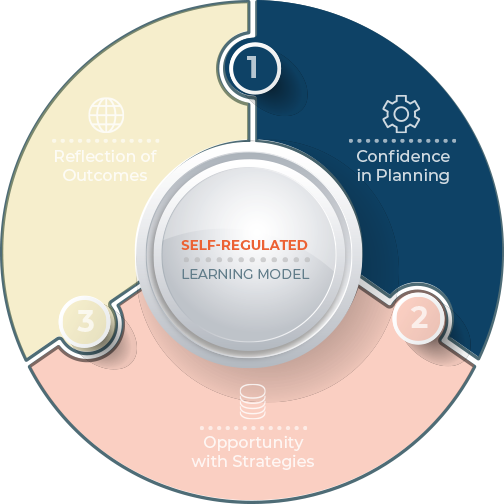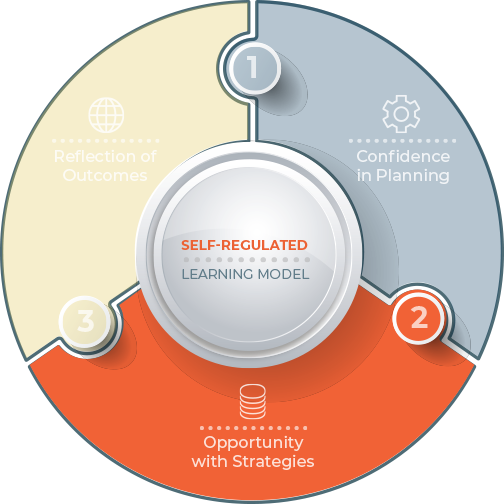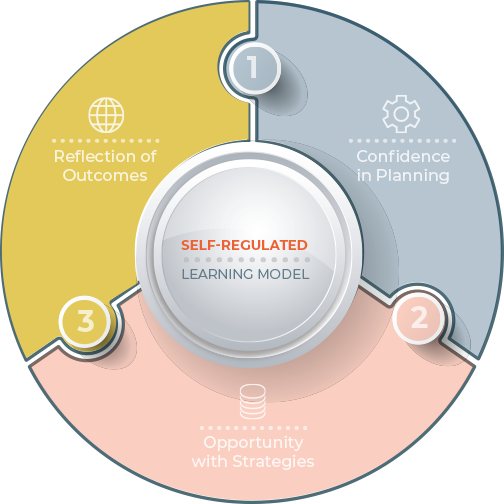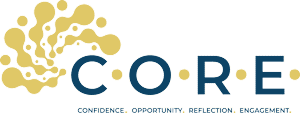Self-Regulated Learning

DEFINITION:
The combination of psychological processes that promote the transfer of knowledge and skills to real-life situations and make students more independent from their teachers in extending and updating their knowledge base (Boekaerts, 1996).

*Many models for transition support involve preparing high school students with content knowledge, skills, and habits of mind before they go to college. Therefore, there is not an opportunity to explore some of the important factors that develop a confident college learner and those are internal factors that occur at the time a student faces novel or new experiences or the momentum of learning that can occur when using a repetitive strategic framework.
*The self-regulated learning model that we will discuss has the potential to increase and sustain learning acquisition if it is modeled and taught by a more abled learner or professional by highlighting both internal factors, such as task perception and outcome expectations, and external factors relating to the student’s new learning environment.
This model is a social-cognitive model of SRL which highlights that learning is not just about the processing inside brain but also involves the external environment of the learner and interactions with others (Zimmerman, 1995b)
The model is cyclical in nature beginning with step or phase 1 “forethought”, moving to step 2 “Performance Control” and then step 3 Self-Evaluation. The phases are cyclical because feedback from each phase is used to make adjustments to future tasks. The cycle is repetitive and begins again.
Forethought

Students who set specific goals and use the correct type of goal have increased academic achievement
(Zimmerman & Kitsantas, 1999)
Forethought phase is the planning phase and sets the tone or approach for learning.
It takes place BEFORE an action for learning has occurred.
Students who are writing a research paper must be able to answer and respond to the purpose and function of the paper and the specific details asked of them before developing the steps toward completion. Also, a student’s perception of how large, difficult, or valuable an academic task can either increase his strategy use or decrease his effortful behavior. Many students enter a task with an inaccurate perception of a task.
Academic achievement is correlated with the type of goal set and plan used by the student. Students that know how to use process goals early in the task and then switch to outcome goals have greater success than those stuck in one goal type. Also, goals can be faulty and does not encourage a successful plan for learning.
Motivation beliefs refer to both what is encouraging the student toward goal completion: intrinsic or extrinsic factors and how does the learner feel about her ability to complete the goal well. Self-efficacy is a predictor for task selection, effort, and persistence. A learner who believes she has the ability to achieve a task does so in a more self-regulated fashion (Zimmerman, 2002). For example, a student with high self-efficacy writing an English paper will set higher goals, use better tools, and feel positive about her possible outcomes.
Task Analysis/Perception/Selection (Lyke & Young, 2006)
Goal Setting (Zimmerman & Martinez-Pons, 1988)
Motivational Beliefs/Effort (Bandura, 1997; Pajares, 1996)
Skills and Tools
- Gathering information
- Developing small steps (reasonable goals)
- Using a calendar/schedule
How does CORE support the student during this phase?
- task initiation
- review of campus systems, finding the location
- interpreting information, scheduling the events / experiences
- analyze and compare timelines of events in relation to when each reflection essay was due; selecting the event;schedule it on your calendar
- balancing the events and assignments with his other coursework
- Set goal reasonably to evaluate time commitment and how he was allocating time across other coursework
Performance Control

Metacognitive awareness is essential for personal change and impacts the flow of the self-regulatory cycle
(Lovett, 2008; Cleary & Zimmerman, 2004)
During the Performance Control Phase, the student selects tools and actions that will help him achieve the goal set in the last phase. The actions are overt engagement in a targeted learning task. However, it is not just writing the paper. This phase involves using tools to write the paper better like imagery, graphic organizers, self-instruction, effort regulation, time & space or the environment where the student chooses to write, does music help the writing process or does it distract the learner, rehearsal of information (for a speech or an exam), and seeking help from a peer or instructor. The student needs to be able (or supported) in monitoring these tools during the active learning phase. The student or professional coach can use self-questions to monitor if the tool is helping or if a different tool would be better. This is called metacognition.
Attention focusing (Chen, 2002)
Help-Seeking (Pintrich et al., 1993)
Metacognition (Stolp & Zabrucky, 2009)
Skills and Tools
- Monthly view/calendar
- Calendar reminders
- Writing tool: Thinking Maps, Inc.
- Using the assignment rubric
How does CORE support the student during this phase?
- TOOL – monthly view of all class tasks and due dates
- Setting reminders
- Heavily dependent on phone reminders cues vs self-awareness of his schedule (example of over dependence on environmental cues vs self-regulation)
- TOOL – Used a thinking map to organize the information for his paper to help with the self-instruction
- Participating in and writing the paper; using requirements of the assignment as outline in the syllabus
Self-Evaluation

Students who engage in self-evaluation out-perform students who do not
(Schunk & Ertmer, 1999).
In the final phase, the student evaluates the learning outcome and considers revisions that may be necessary for future academic tasks. The student will evaluate the behaviors of both planning and using tools. The student will determine the outcome to be a success or failure by comparing the expected outcome to the actual outcome. The learner might also judge the outcome based on pervious outcomes or a peer’s outcome.
There is usually a feeling associated with the evaluation of the outcome. Is the student happy, frustrated, surprised? These feelings (whether merited or not) can effect the reason the student attaches to why the outcome happened. The most common causal attributions that pertain to achievement are ability, effort, task difficulty, and luck. Because these attributes are characterized as internal/external, controllable/uncontrollable, and stable/unstable – have a significant impact on future task selections and motivational beliefs, which bring us right back to phase 1. Without participating in the self-evaluation process, and with a skilled professional to model, the learner could fail to reengage in a similar task in the future.
Evaluate Behavior (Zimmerman, 2002)
Outcome Expectations (Tollefson, 2000)
Outcome Determination (Weiner, 2010)
Causal Attributions (Schunk, 2005)
Adaptability (Zimmerman, 2000)
Student Process & Task Outcome
- Expected Outcome
What were his expectations? - Outcome determination
Were the expectations met? - Identify causes of outcome
How did planning & organizational strategies work? - Revision for future tasks
Modifying timeline for how far in advance the experience needs to be before due date to provide adequate time to complete writing assignment
How does CORE support the student during this phase?
- Reflecting on how it worked to find / scheduled and attend the experience
- What were his expectations?
- Were his expectations met and how so? Locust of control of experience
- Learning : Time management
How far in advance do I need to attend the experience and execute the writing tasks? - Expectation to do experience and write about it in 1 day. Should set my next goal to capture more time between attendance and task completion
Join Other Students Enjoying a CORE Education Now
Become Part of CORE to Further Your Education.
